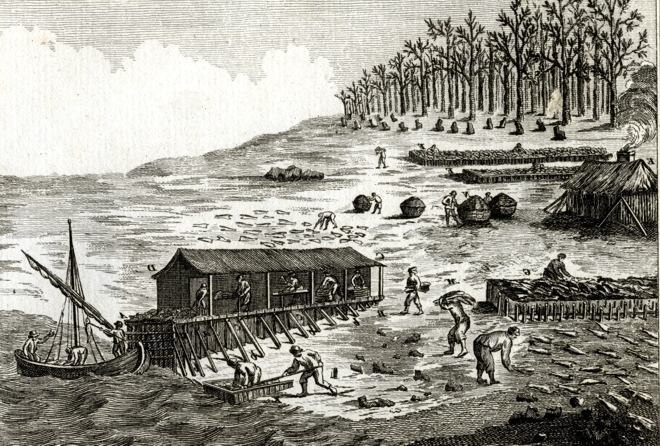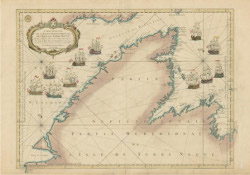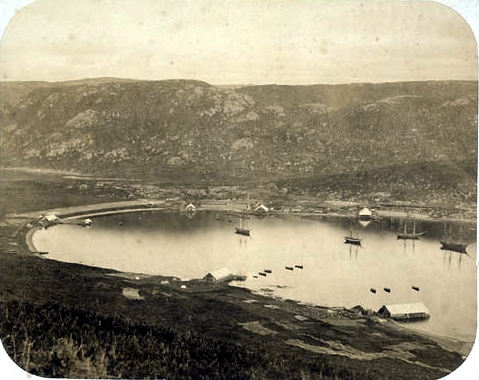Useful terms
For details, see G. M. Story, W. J. Kirwin, and J. D. A. Widdowson Dictionary of Newfoundland English, 2nd ed. (Toronto, 1990):
- Beothuk: the Amerindian Native people of Newfoundland when Europeans arrived, circa 1500.
- Chaloupe (English shallop): an open wooden boat about 10 m long (30-35 feet ) used to fish for cod.
- Cookroom: a temporary structure used to prepare and serve meals to seasonal fishing crews.
- Dry fish: lightly salted, air-dried cod.
- English Shore: the east coast from Trepassey to Bonavista Bay, after 1565 seasonally frequented by West Country fishing crews and settled by fisherfolk after 1610.
- Fishing admiral (French amiral): the fishing master arriving first in a particular harbour in spring, claiming first choice of fishing rooms and the right to enforce the traditional custom of the fishery during the ensuing fishing season. Fishing admirals were not naval officers.
- Fishing banks: offshore fishing grounds, for example the Grand Banks, exploited by French ships since about 1550 and by English and colonial ships after 1713. Properly speaking, inshore fishing grounds are not banks.
- Fishing master: person in charge of a fishing ship.
- Fishing room: the shore space from which fishing crews carried out the inshore fishery.
- Fishing ship: a ship coming to Newfoundland for the summer, carrying fishermen and provisions for an inshore fishery prosecuted in open boats. These so-called fishing ships also often carried fish to market.
- Flake (French vignaud): a scaffold of poles, supporting a rough surface of evergreen boughs, used to dry salt cod.
- French Shore: in the seventeenth century, loosely the area where the French fished, especially between Trepassey and Port aux Basques on the south coast of Newfoundland. In the eighteenth and nineteenth centuries, a diplomatically-defined French fishing zone on the northeast and west coasts of the island, including the Petit Nord.
- Galet: the Breton term for a cobbled area used for drying fish. Literally, a cobble.
- Grève: the Norman term for a stoney area used for drying fish. Literally, a beach.
- Green fish: synonym for wet fish, heavily salted in a brine, the standard cure on the Grand Banks.
- Inshore fishery: the fishery carried out from shore stations in open boats going to sea daily.
- Make fish, to: producing dry salt cod from fresh fish.
- Master: the person in charge of a ship or boat.
- Migratory fishery: the seasonal inshore fishery prosecuted along the coasts of Newfoundland by transient fishers from Europe and the seasonal offshore fishery prosecuted on the Grand Banks and other fishing banks, notably by ships from Normandy.
- Offshore fishery: the fishery prosecuted from ships venturing to the Grand Banks and other fishing banks for weeks at a time, in the 17th century by French ships.
- Petit Nord: the Atlantic coast of Newfoundland's Great Northern Peninsula, including the Bay Verte Peninsula, where Bretons and Normans prosecuted a migratory inshore fishery from about 1500 until 1904.
- Quintal: 112 pounds, a traditional unit of weight for salt fish, pronounced 'kental'.
- Stage (French chauffaud): a rough wooden wharf with an enclosed space for unloading and processing fish.
- Stratum: A deposit of soil, distinct from older deposits below and younger deposits above.
- Train oil: cod liver oil, shipped to Europe in barrels for industrial use.
- Vegetation shadow: a patch of anomalous vegetation, often introduced weedy species, that may signal a hidden archaeological feature.
- Wet fish: cod heavily salted in a brine


